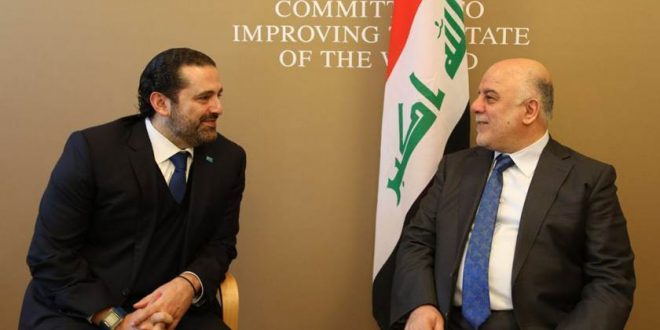Prime Minister Saad Hariri returned to Beirut Thursday night after concluding his official meetings on the sidelines of the World Economic Forum.
According to a statement from his office, in his final day at the major international summit in the Swiss alpine town of Davos, Hariri discussed Lebanese-Iraqi relations Iraqi counterpart, Prime Minister Haider al-Abadi.
The same day, Hariri held separate meetings with the president of the World Economic Forum, Borge Bredne, and the head of Italian energy company ENI, Claudio Descalzi.
ENI is one of the companies in a consortium that recently won a bid to carry out exploratory drilling off Lebanon’s coast – possibly as soon as 2019.
The consortium includes French oil giant Total and Russian gas producer Novatek.
Hariri began his Davos visit Tuesday and met numerous high-ranking foreign officials and heads of delegations to discuss donor conferences and regional developments.
The upcoming Rome II conference to support the Lebanese Army was a major feature of his meetings Tuesday and Wednesday, including with his Italian counterpart Paolo Gentiloni.
While the previous Rome conference in 2014 focused on the Lebanese Army, the upcoming Rome II summit will also look at ways the international support can assist the other branches of Lebanon’s security agencies.
Hariri also met with the International Monetary Fund head Christine Lagarde to talk about the upcoming Paris IV meeting in the spring to address the country’s stalled economy.
The pair discussed preparations and Hariri briefed Lagarde on the final steps to be taken on an investment program which will be presented at the donor conference. He also invited her to attend.
Paris IV will follow up from the last Paris donor conference held in the wake of the 34-day 2006 Hezbollah-Israel war.
Lebanon will also attend the Brussels donor conference to support Syria and countries hosting large numbers of refugees fleeing the conflict.
During his official visits Wednesday, Hariri met Jordan’s King Abdullah II and announced an imminent visit to Jordan to discuss the issue of Syrian refugees.
“I have received great support from his Majesty [King Abdallah II] for Lebanon … on the issue of displaced persons and other [issues],” Hariri’s office quoted him saying.
According to the office’s statement, the scheduled visit will take place before April’s Brussels conference on the Syrian crisis.
The annual event will follow up on last year’s Brussels conference and the London conference in 2016, focusing on international support for those affected by the Syrian crisis and host countries.
Despite its myriad crises, Hariri said Lebanon could face the country’s domestic challenges, “because we have the will … but when Israel decides to launch a war against Lebanon, what can we do?
“I believe that the current administration in Israel does not want peace. We have seen people in Israel that wanted peace,” Hariri added.
 Lebanese Ministry of Information
Lebanese Ministry of Information



